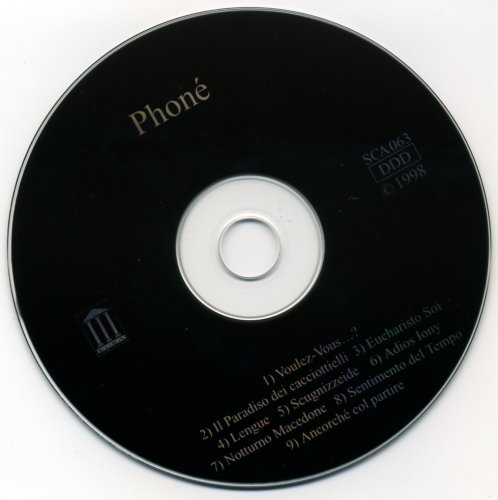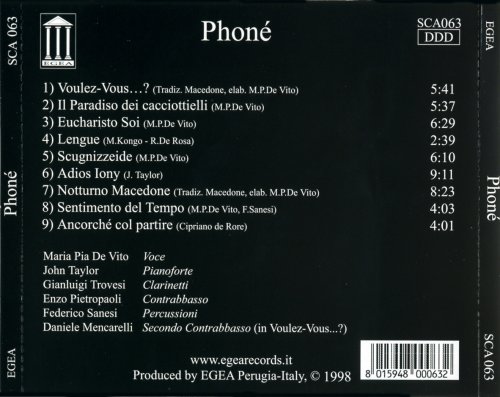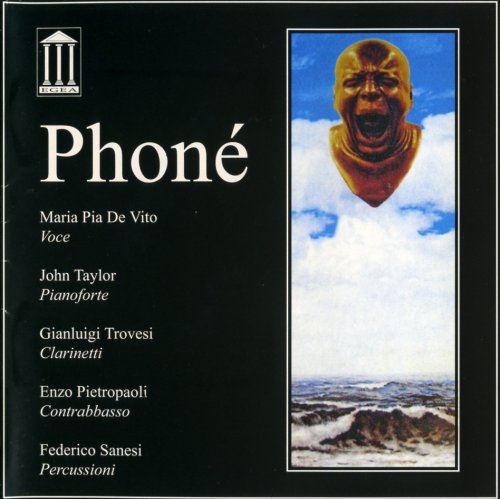
Maria Pia De Vito, Enzo Pietropaoli, Federico Sanesi, Gianluigi Trovesi, John Taylor - Phone (1998)
BAND/ARTIST: Maria Pia De Vito, Enzo Pietropaoli, Federico Sanesi, Gianluigi Trovesi, John Taylor
- Title: Phone
- Year Of Release: 1998
- Label: EGEA: SCA 063
- Genre: Contemporary Jazz, Ethnic Jazz, Vocal Jazz
- Quality: FLAC (tracks+.cue,log,scans)
- Total Time: 52:17
- Total Size: 248 mb
- WebSite: Album Preview
Tracklist:
1 Voulez-Vous…? 5:36
2 Il paradiso dei cacciottielli 5:34
3 Eucharisto soi 6:25
4 Lengue 2:36
5 Scugnizzeide 6:07
6 Adios Iony 9:07
7 Notturno macedone 8:20
8 Sentimento del tempo 3:59
9 Ancorchè col partire 4:02
Maria Pia De Vito - vocals
Gianluigi Trovesi - alto clarinet
Enzo Pietropaoli - double bass
Federico Sanesi - percussion, tabla
Daniele Mencarelli - double bass (1)
John Taylor - piano


1 Voulez-Vous…? 5:36
2 Il paradiso dei cacciottielli 5:34
3 Eucharisto soi 6:25
4 Lengue 2:36
5 Scugnizzeide 6:07
6 Adios Iony 9:07
7 Notturno macedone 8:20
8 Sentimento del tempo 3:59
9 Ancorchè col partire 4:02
Maria Pia De Vito - vocals
Gianluigi Trovesi - alto clarinet
Enzo Pietropaoli - double bass
Federico Sanesi - percussion, tabla
Daniele Mencarelli - double bass (1)
John Taylor - piano
Maria Pia De Vito is bit of an enigma here in the US. She is well known in Italy and has performed throughout Europe. Vito possesses a rare combination of vocal prowess and adventuresome spirit. Her music is often experimental, yet grounded in traditional forms of harmony and melodic patterns. Like Norma Winstone and Theo Bleckman, she often forgoes lyrics altogether, using her voice as an instrument onto itself. She belongs to that select group of vocalists who are unafraid to take liberal risks in their choice of material.
Although Phoné is not her latest recording, it is worthy of recognition and a great introduction to her work. It is a very special disk indeed. The addition of John Taylor to the date makes it all the more interesting. His playing with the ensemble is always right on and in duets with Vito he is often spectacular. The inimitable choices of instrumentation are rarely given a treatment such as this. Djembe, tabla, kit drums, clarinet, bass, piano and voice appear in various combinations throughout.
The concept for Phoné comes from a desire to depict the myriad ways in which the human voice influences our world. To do this, Vito gives us a selection of tunes ranging from the Italian Renaissance to the African Congo. Most of the songs are based upon traditional folk or old world melodies, rearranged by Vito and the ensemble. But be forewarned, none of the lyrics (when there) are in English, so you must translate or be content with the sound alone. Please do not be deterred!
Highlights on the disk are many. "Voulez-vous" is a quickly moving piece in 11/8 and 7/8, which is a kick to tap your feet with! Based on a Macedonian folk tune, it incorporates all the positive skills of this ensemble. The melody effortlessly moves across cultural boundaries and continental borders. "Il Paradiso dei cacciottielli," is a gorgeous duet with Taylor based on a Tuareg lullaby. This song is near perfect in every way, with a seemingly simple melody that subtly adds tricky intervals as it unfolds. Taylor's harmonic ability to stretch the boundaries will give you chills. Written in 1547, "Anorché col partire," is a wonderful ancient tune with a sensuously spiritual sound by today's standards.
Taylor's exuberant composition, "Adios Iony," features the entire ensemble. The tabla serves as a rhythmic foundation over which Taylor and Pietropaoli vamp and Vito vocalizes the rapidly floating melody. Trovesi provides an intense solo while Sanesi adds darting snare drum and cymbals. All adds up to a very enticing wild-like dance quality. On "Sentimento del Tempo," Vito and Sanesi perform a tabla duet, Vito giving her version of bols, vocal syllables that imitate the tabla. These are difficult enough for a percussionist and surely challenging for any jazz singer.
Mention need also be given to the engineering of Francesco Ciammarughi and mastering of Nando D'Eramo. This is an absolutely beautiful recording. Great attention to detail was given in capturing Vito's voice. Piano, clarinet and bass are distinct and sumptuous. All of the various percussion instruments are properly displayed. Sound staging is as good as it gets, presenting a wide stereo image with well-placed individuals.
Although Phoné is not her latest recording, it is worthy of recognition and a great introduction to her work. It is a very special disk indeed. The addition of John Taylor to the date makes it all the more interesting. His playing with the ensemble is always right on and in duets with Vito he is often spectacular. The inimitable choices of instrumentation are rarely given a treatment such as this. Djembe, tabla, kit drums, clarinet, bass, piano and voice appear in various combinations throughout.
The concept for Phoné comes from a desire to depict the myriad ways in which the human voice influences our world. To do this, Vito gives us a selection of tunes ranging from the Italian Renaissance to the African Congo. Most of the songs are based upon traditional folk or old world melodies, rearranged by Vito and the ensemble. But be forewarned, none of the lyrics (when there) are in English, so you must translate or be content with the sound alone. Please do not be deterred!
Highlights on the disk are many. "Voulez-vous" is a quickly moving piece in 11/8 and 7/8, which is a kick to tap your feet with! Based on a Macedonian folk tune, it incorporates all the positive skills of this ensemble. The melody effortlessly moves across cultural boundaries and continental borders. "Il Paradiso dei cacciottielli," is a gorgeous duet with Taylor based on a Tuareg lullaby. This song is near perfect in every way, with a seemingly simple melody that subtly adds tricky intervals as it unfolds. Taylor's harmonic ability to stretch the boundaries will give you chills. Written in 1547, "Anorché col partire," is a wonderful ancient tune with a sensuously spiritual sound by today's standards.
Taylor's exuberant composition, "Adios Iony," features the entire ensemble. The tabla serves as a rhythmic foundation over which Taylor and Pietropaoli vamp and Vito vocalizes the rapidly floating melody. Trovesi provides an intense solo while Sanesi adds darting snare drum and cymbals. All adds up to a very enticing wild-like dance quality. On "Sentimento del Tempo," Vito and Sanesi perform a tabla duet, Vito giving her version of bols, vocal syllables that imitate the tabla. These are difficult enough for a percussionist and surely challenging for any jazz singer.
Mention need also be given to the engineering of Francesco Ciammarughi and mastering of Nando D'Eramo. This is an absolutely beautiful recording. Great attention to detail was given in capturing Vito's voice. Piano, clarinet and bass are distinct and sumptuous. All of the various percussion instruments are properly displayed. Sound staging is as good as it gets, presenting a wide stereo image with well-placed individuals.


Jazz | Vocal Jazz | World | Ethnic | FLAC / APE
As a ISRA.CLOUD's PREMIUM member you will have the following benefits:
- Unlimited high speed downloads
- Download directly without waiting time
- Unlimited parallel downloads
- Support for download accelerators
- No advertising
- Resume broken downloads


